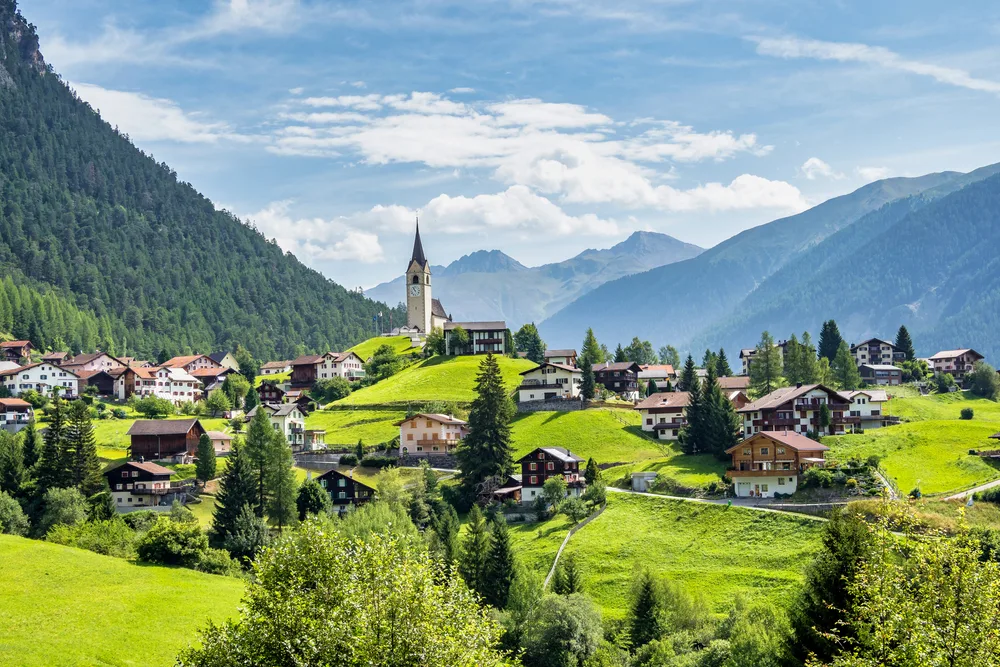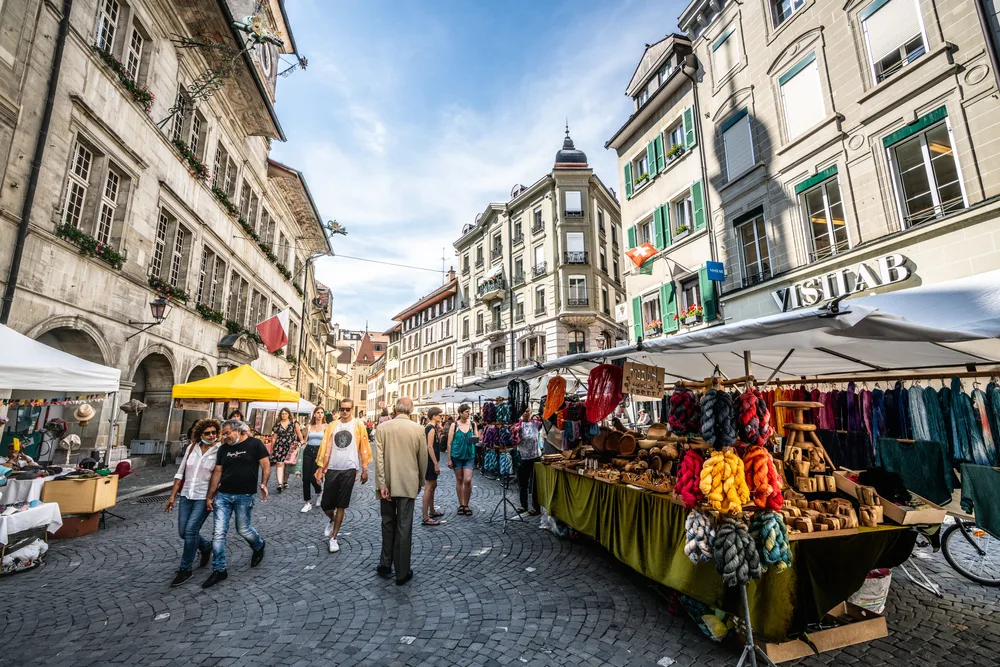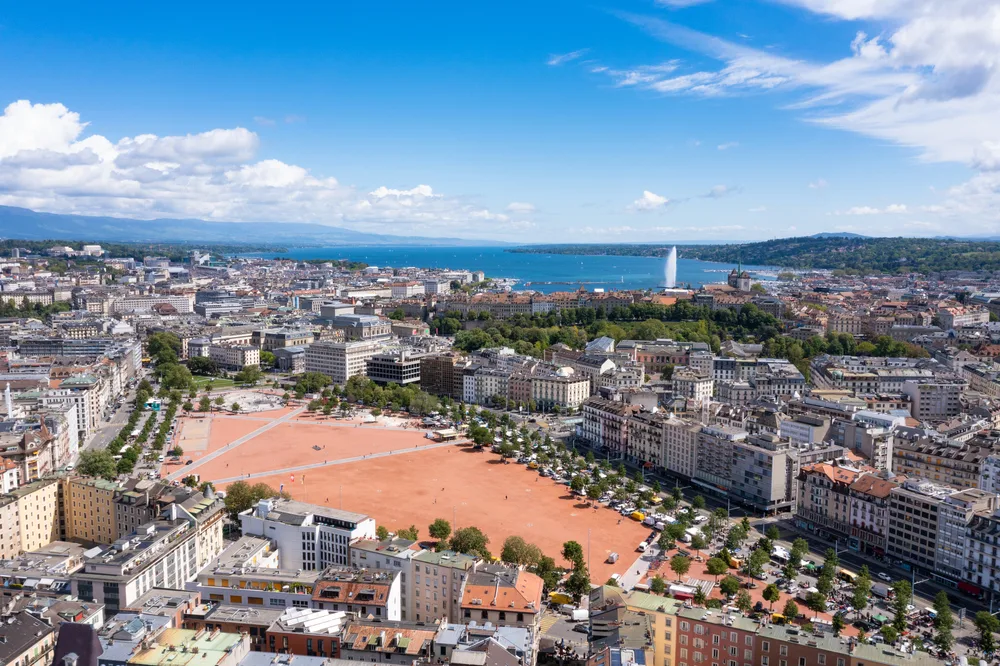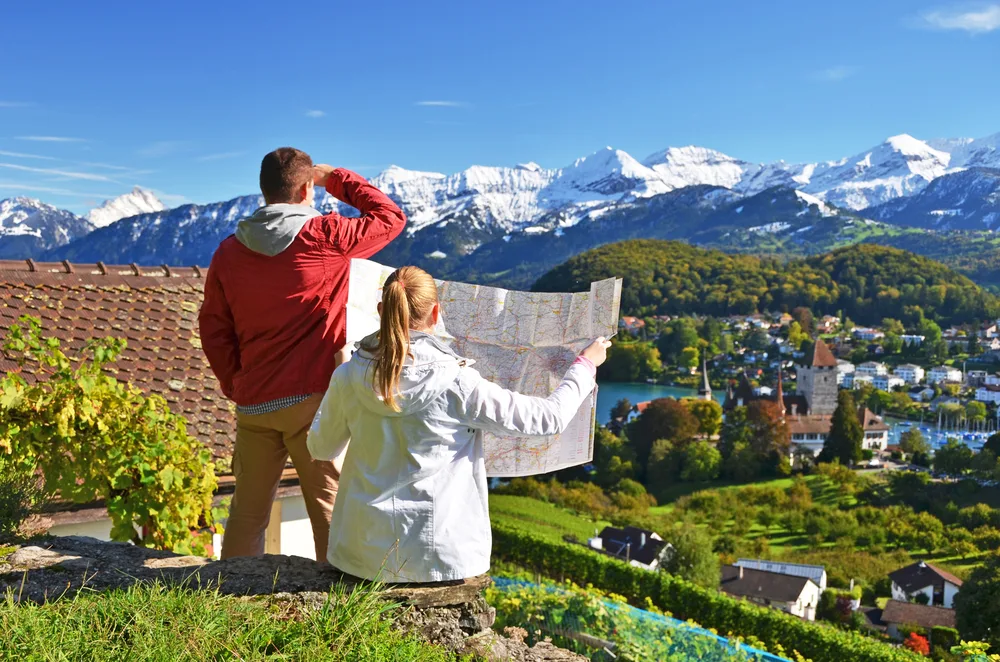The country of Switzerland is one of the most popular countries to visit for lovers of nature and European history. The country receives a whopping 21 million tourists a year.
The biggest draw of this storied destination is its natural beauty. Switzerland is covered by the Alps mountain range, which means there are stunning vistas, picturesque hiking trails, and challenging ski trails wherever you look.
In the winter, you can try your skills at famous ski resorts such as Zermatt, while in the summer you can explore beautiful locations such as the Rhine Falls or Lake Lugano.
Switzerland’s cities are also worth a visit, such as beautiful Bern and orderly Zurich. Wherever you go, country or city, Switzerland is a beautiful place to visit. However, you may be wondering if it is also a safe place to visit.
This travel guide can help you prepare for your trip. Keep reading to learn more about safety in Switzerland, including crime information.
Is Switzerland Safe to Visit in 2024?

RudiErnst/Shutterstock
Yes, Switzerland is one of the safest countries in the world, making it an ideal destination for your next vacation.
It has a low crime rate, although crime still happens. While you shouldn’t let the relative safety convince you to abandon common sense, you don’t have to take extra precautions to stay safe during your visit.
Switzerland is one of the safest countries in the world, so you don’t have much to worry about when you plan your trip there. According to the Global Peace Index, Switzerland is the 10th safest country in the world.
The index measures factors such as internal and external conflict and societal militarization. It’s hard to find a place to visit that is much safer than Switzerland. Most travel advisories agree that Switzerland is a safe place to visit.
Governments such as the United States just advise their citizens to exercise normal precautions in Switzerland and issue Level One travel advisories for the country, the lowest possible advisory. What dangers these advisories do mention tends to be petty.
The most common problems you’ll encounter include:
- Pickpocketing
- Bag snatching
- Car break-ins
- Cyber scams
- Robbery
These crimes are mostly petty in nature. Although they are present in Switzerland, the rate of most crimes is fairly low. One country does issue an elevated travel advisory for Switzerland, and that’s New Zealand.
New Zealand advises its citizens to exercise increased caution in Switzerland due to the risk of terrorism. There is a risk of terrorism throughout Europe, with terrorist groups frequently issuing threats along countries on the continent, including Switzerland.
The Swiss Federal Office of Police explains the situation regarding terrorism on its website. It also describes the terrorist threat facing Switzerland as acute—but that’s because it evaluates the risk towards the continent of Europe as a whole as acute.
There have been terrorists radicalized in Switzerland, or those who used Switzerland as bases to plan and finance their attacks elsewhere. However, recent terrorist attacks in Switzerland have been few and far between.
A woman injured two people in Lugano around Christmas 2020 in a suspected terrorist attack, but there have been no deadly terrorist attacks in Switzerland for years. Switzerland is probably one of the European countries where you are at the lowest risk of a terrorist attack thanks to strong authority measures against the threat.
A more likely threat to your safety in Switzerland than crime or terrorism is the very nature that you probably came to see. The Alps are as brutal as they are beautiful. In summer or winter, when you are heading into nature, it’s important to follow safety tips.
The Swiss Alpine Club offers a few tips on its website for exploring Switzerland’s nature safely:
- Don’t push yourself too hard with trail difficulty and pace—don’t forget that you have to climb down the mountain after you climb up.
- Research the route and weather conditions ahead of time.
- Take layered clothing, good hiking shoes, food, and water, but don’t overpack.
- Make sure that you always stay on marked paths.
- Let someone else know where you are going and when you expect to be back.
- During the winter, read the avalanche report before heading out.
It’s always a good idea to ask a local for advice, and if you’ve never been hiking or skiing before, to join an organized tour or hire a local guide.
Crime in Switzerland

Lausanne Switzerland , 26 June 2020 : People at creative artisans market on Place de la Palud or Palud square in Lausanne Vaud Switzerland/Keitma/Shutterstock
Like in any other place, crime can occur in Switzerland. However, the rate of crime in the country is actually fairly low. While you should be on your guard against some forms of crime, you don’t need to be overly cautious.
The Swiss Federal Police publishes data about the crimes recorded each year. In 2022, 65.8% of criminal code violations were property crime violations. 5.9% were violent crimes that were threats to people’s life or bodily integrity.
The most common form of property crime is theft, which makes up 42% of total property crimes committed. The next most common form of property crime is vehicular theft, which makes up 15% of total property crimes committed.
The good news is that the country has a low rate of violent crime. According to the World Bank, the homicide rate is near 0 incidents per 100,000 people, which means that the number of annual homicides are statistically insignificant.
In 2022, there were only 42 homicides in all of Switzerland. The most common violent crime is assault, which makes up about 30% of total violent crimes. There is a perception (which some countries even mention in their travel advisories) that crime has gone up over the past few years. About 61% of Swiss people believe crime has gone up.
The Federal Police admits on its website that certain crimes, such as burglaries, have increased in recent years. However, local news investigated this subject and found that despite blips in the crime rate, Switzerland is still extremely safe.
The perception that it is now a crime-ridden country is usually caused by sensational TV news shows as well as prejudices against foreigners.
The types of crime that Switzerland has become a haven for, such as money laundering and financial crimes, rarely affect average citizens or tourists. You don’t have much to worry about when it comes to crime in Switzerland.
Theft From Vehicles
Crime in Switzerland tends to be petty in nature. One of the most common petty crimes is theft from vehicles. The Canadian government warns about the prevalence of car break-ins in its travel advisory.
Thieves operate on highways, around gas stations and popular rest stops. In the cities, they also target cars in overnight parking or on street parking. Thieves often target cars belonging to tourists, which they identify thanks to foreign license plates or rental car stickers.
They know that tourists are more likely to have their possessions in their car than locals. Basic precautions can help deter car break-ins, or at least minimize the devastating effect if a theft does happen. The number one precaution you should take is never to leave your valuables in your car.
Even if you think you put your ID or wallet in a secure place such as your glove compartment, it’s better to take everything you can’t afford to lose with you whenever you leave the car, even if you’re just stepping out to pay for gas.
If you do have to leave items in your car, such as luggage or shopping bags, make sure that you leave them somewhere that is out of sight such as your trunk. When stopping, don’t open your trunk or do anything that makes it visible how much stuff you have.
When parking your car overnight, you’re leaving yourself vulnerable to car theft and vehicle break-ins. Try to park your car in a secure location, such as a parking garage with cameras or a parking lot provided by your accommodation.
Of course, the best way to protect from this crime is to avoid renting a car at all. Swiss road trips have their own charm, but the public transportation is one of the best in the world, so you can easily get around the country without a car.
Petty Theft

Cat Box/Shutterstock
Although the rate of petty theft in Switzerland is not nearly as high as it is in other countries, crimes such as pickpocketing and bag snatching happen here as well. The Australian government mentions the risk of this crime, especially in areas where thieves know tourists tend to congregate.
Hotspots for theft are popular tourist areas in the cities of Bern, Zurich, and Geneva. Thieves in the cities tend to operate around popular tourist attractions, near transportation hubs such as train stations, and on public transportation.
Theft increases around Christmas as people flock to Switzerland to check out the famous Christmas markets and other attractions. The Geneva airport in particular is a hotspot for crime. To protect from theft in the city, make sure that your valuables are secure as you walk around the city.
Put your phone, wallet, and ID in a place where it’s not likely that someone can steal it without you noticing, such as your front pocket or a zipped compartment of your bag. Never leave your bag unattended or wander too far away from it.
Theft can also happen on Switzerland’s intercity buses or trains. Thieves tend to go through people’s bags while they are sleeping.
When you are traveling, never put your valuables in overhead compartments or luggage storage racks but keep them in a smaller bag closer to your person. That way, nobody can take them without you noticing.
Avoiding Bad Areas

Samuel Borges Photography/Shutterstock
Switzerland is such a safe country that there are few areas that you should avoid. The big cities have a few areas that have higher crime rates.
In Geneva, the area around the train station and the neighborhoods of Paquis and Plainpalais have a bad reputation. In Zurich, Langstrasse can get a bit rowdy at night.
Things to Consider

Zurich, Switzerland – June 14, 2019: Women’s Strike in the streets of Zurich./elizabethdalessandro/Shutterstock
Here are a few additional safety tips for Switzerland:
- Follow all the laws as penalties are severe. The Swiss have a well-earned reputation for being sticklers for rules, and fees for minor offenses such as not validating your public transportation ticket, stopping illegally on the road, or covering your face are hefty.
- Be careful around strikes and demonstrations. Occasional strikes disrupt public services such as trains. Demonstrations sometimes turn violent, such as on May 1st (Labor Day) and August 1st (Swiss National Day).
- Avoid soccer games. Switzerland has a surprisingly severe soccer hooligan problem, and there are often clashes between rival fans. If there is a high-profile match on, avoid the area around a stadium.
- Adjust to local norms. Swiss people value politeness, so don’t raise your voice in public, talk on your phone on the train, or invade someone’s personal space.
Frequently Asked Questions

Capricorn Studio/Shutterstock
Here are a few common questions people often ask before traveling to Switzerland:
Is Switzerland safe to travel to right now?
Yes, Switzerland is safe to travel to right now. Although crime has risen slightly, it is still a very safe country, and this crime is mostly petty in nature.
Is it safe to walk around Switzerland at night?
Yes, Switzerland is mostly safe to walk around at night. However, use common sense precautions such as sticking to familiar, well-lit areas.
Is it safe to walk in Zurich at night?
Most of Zurich is safe even at night. However, some parts, such as Langstrasse, are a bit sketchy after dark.
Is it expensive to visit Switzerland?
Switzerland is safe, but it is definitely not inexpensive. It is one of the most expensive countries in the world, so budget accordingly.
Do they speak English in Switzerland?
About half of Swiss people speak English as a second (or third or fourth) language. It is more common among young people and in big cities.
Over to You — Book Your Trip Today!
Switzerland is one of the safest countries in the world to visit. You should still take basic precautions, such as not leaving your valuables lying around, but you don’t have to worry too much about visiting.
So, with so much to see and do, what are you waiting for — book your trip today and experience for yourself all that Switzerland has to offer. Happy travels!



